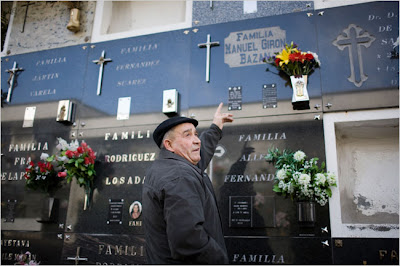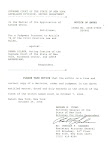
Antonio Prada Girón at the grave of his mother, who never knew the fate of Jesús, the baby taken from her.
For 65 years, Ms. Girón, a hard-bitten mother of seven, ached to know what had become of her son Jesús. Born in the early 1940s during the vengeful first years of Gen. Francisco Franco’s 36-year dictatorship he was taken from her to be baptized shortly after his birth. She never saw him again.
“To her last, my mother bore the anguish of not knowing what had happened to Jesús. She yearned to meet the child that they had stolen,” said Antonio Prada Girón, 69, the oldest child of Ms. Girón, who died in 2007 at the age of 95.
Sifting through family documents and photographs in the slate-roofed cottage where his mother once lived, Mr. Prada said his parents were persecuted in the years after Franco took power by the police, who were hunting for his uncle, a fugitive guerrilla. Mr. Prada’s parents, who farmed the vine-covered hills around this northwestern hamlet, were jailed when he was 2. His mother gave birth to Jesús soon afterward.
The story is part of a dark and long overlooked chapter of the repressive decades under Franco that has drawn fresh attention since November, when Judge Baltasar Garzón ordered provincial judges to investigate the “disappearance” of children taken from left-wing families as part of an effort to purge Franco’s Spain of Marxist influence.
Historians and associations that represent Franco’s victims say hundreds of children were taken from families who had supported Franco’s Republican opponents during the Spanish Civil War from 1936 to 1939 or who were suspected of ties to left-wing groups. The children were adopted or sent to religious schools and state-run homes.
Some were baptized with new names, their birth records hidden or destroyed, they say. Others, sent into exile during the war by the Republicans and brought back by Franco, were given new identities.
“In a sense, this is the most symbolic crime of the Franco era,” said Emilio Silva, head of the Association for the Recovery of Historical Memory, an organization that has excavated the remains of hundreds of people from Franco-era graves. “To steal a child and take away his identity — that’s what Franco did to the country as a whole.”
In his 152-page court order, Judge Garzón wrote, “There was a ‘legalized’ disappearance of minors, who lost their identity, and whose number remains uncertain.” He suggested that there could be thousands of “lost children,” but historians say that figure is inflated.
“There were definitely kidnappings of children in prisons, abuses. But we really don’t know how many,” said Angela Cenarro Lagunas, a professor of modern history at the University of Zaragoza.
Ricard Vinyes, a professor of modern history at the University of Barcelona and the author of a book on female prisoners of the era, said documents and oral testimonies indicated that hundreds of children lost their identities when they were separated from their imprisoned mothers.
The case has some echoes of Argentina’s dirty war in the 1970s and 1980s, in which children of murdered dissidents were secretly stolen and, often, adopted by military families. Mr. Vinyes said Franco was open about his project to re-educate the children of his enemies.
Franco’s top military psychologist, Antonio Vallejo Nágera, claimed that Spain could be saved from Marxism by isolating children from Republican parents. A 1940 decree allowed the state to take children into custody if their “moral formation” was at risk.
“Their logic was that the solution lay in separating children from their mothers,” Mr. Vinyes said.
Catholic schools and the welfare system known as Social Aid became a machine for political reorientation. Social Aid children led a life of fascist doctrine, harsh discipline and Catholic ritual, Ms. Cenarro said.
According to Mr. Vinyes, nearly 31,000 children were registered as being in state custody at some point between 1945 and 1954, a majority of them from Republican families. For many, it was because their parents were imprisoned or executed; for some, it was because their families — partly as a result of Franco’s disastrous policy of autarky — could not support them.
Uxenu Ablaña, 79, said he was tormented because of his leftist background in the Catholic and welfare homes where he lived from 6 to 18. Mr. Ablaña, a retired machinery salesman who grew up in Spain’s north, in the Asturian village of Pravia, went into state custody after the police killed his mother and jailed his father for collaborating with the Republicans. He said that in the homes he was named Eugenio Álvarez, the Spanish version of his Asturian name.
“They called me ‘child of a red,’ communist, devil,” Mr. Ablaña said by telephone. He recalled being made to spit-polish 80 pairs of shoes in a broom cupboard. “It is as if my life ended the day I went to Social Aid.”
Now that Judge Garzón has ordered the investigation into “lost children,” associations representing Franco’s victims say they believe that they may locate some of them. The judge instructed provincial courts in January to collect DNA samples from several aged or sick Spaniards searching for family members.
Fernando Magán, a lawyer for the Association for the Recovery of Historical Memory, said judges could open adoption registers and lists of children in Social Aid homes and religious schools.
Mr. Prada, who settled in France in 1958 but returns each winter to Lombillo, said finding his brother would help close wounds.
“It has left a hole in my life, knowing that I have a brother, not knowing where he is, whether he was brought up by good people,” he said, fingering the yellowed family book, the official booklet in which the Girón family members are listed. Jesús is not registered there.
When Mr. Prada was about 10, he and his grandmother made the 180-mile trip to Salamanca, where his mother had been imprisoned, to look for Jesús. They found nothing, and guards at the orphanage threatened to send his grandmother to jail if she persisted in her search.
“To think, I might have walked by him once in the street without knowing,” he said, his eyes reddening. Even with the new investigation, he said, the chances of finding Jesús are minute. “It’s like looking for a needle in a haystack.”
Families Search for Truth of Spain’s ‘Lost Children’ - NYTimes.com
Link above with more pics
Refresh - Go to homepage























No comments:
Post a Comment